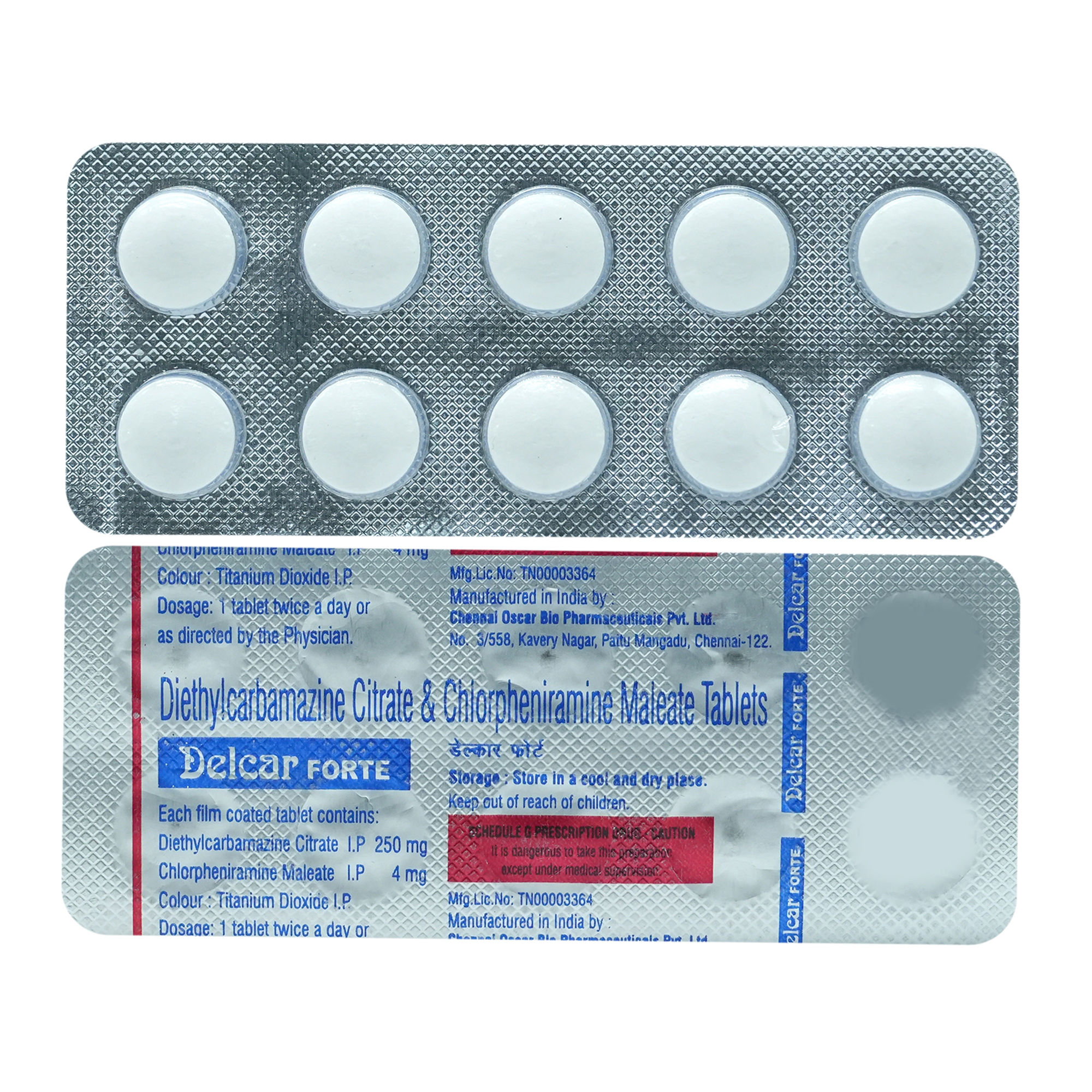Diethylcarbamazine+chlorpheniramine
About Diethylcarbamazine+chlorpheniramine
Diethylcarbamazine+chlorpheniramine belongs to a group of medicines called 'anti-parasitic' used to treat certain worm or parasitic infections, including Bancroft's filariasis, eosinophilic lung, loiasis, and river blindness. The worms or parasites live inside the human body and receive important nutrients from a person's body and make them sick called parasitic infection. Diethylcarbamazine+chlorpheniramine does not work against worm infections caused by pinworms or tapeworms.
Diethylcarbamazine+chlorpheniramine consists of two medicines, namely: Diethylcarbamazine (antiparasitic) and Chlorphenamine (antiallergic). Diethylcarbamazine paralyzes the parasitic worms by stopping them interacting with the host cell, thereby killing it. On the other hand, Chlorpheniramine works by reducing the allergies symptoms characterized by increased white blood cells (eosinophils), sneezing, runny nose and watery eyes. Thus, Diethylcarbamazine+chlorpheniramine prevents the growth of worms in the human body by killing microfilariae and some of the adult worms in the human intestine and reducing allergic symptoms caused by parasitic worms.
Take Diethylcarbamazine+chlorpheniramine as prescribed. Your doctor will recommend you how often you take Diethylcarbamazine+chlorpheniramine based on your medical condition. Some persons may experience itching, swelling of the face, especially near the eyes, tightness in the chest or throat, wheezing, sleepiness, and nervousness. Contact your health care provider if these side effects persist or worsen.
It would be best if you regularly have your eye checkups while taking treatment with Diethylcarbamazine+chlorpheniramine. Diethylcarbamazine+chlorpheniramine may cause dizziness, affects thinking ability and changes vision so make sure that you did not drive or do any work that needs a clear vision if any of the unpleasant effects of medicine become bothersome then call your doctor on an urgent basis. Diethylcarbamazine+chlorpheniramine is allowed to use in pregnancy as it a category B drug that is not supposed to harm an unborn baby. This medicine can only be used in breastfeeding when strictly advised by the doctor as it has the ability to pass into breast milk.
Uses of Diethylcarbamazine+chlorpheniramine
Medicinal Benefits
Diethylcarbamazine+chlorpheniramine consists of Diethylcarbamazine and chlorpheniramine as its medicinal constituents and is used to treat certain types of parasitic infections. Diethylcarbamazine+chlorpheniramine is an anti-parasitic medication that works by killing worms and inhibits the action of histamine (a natural chemical released by the body) responsible for causing allergic reactions in the body during parasite infection. Besides this, it also reduces the levels of eosinophil count (white blood cells), which increases during parasitic infection and thus controls breathlessness, cough, and cold associated with it.
Directions for Use
Storage
Side Effects of Diethylcarbamazine+chlorpheniramine
- Itching or swelling of the face
- Blistering
- Peeling skin
- Wheezing
- Tightness in the chest
- Fever
- Skin rash
- Headache
Patients Concern
Disease/Condition Glossary
Bancroft's filariasis: It is caused by thread-like worms that live inside the lymphatic system of humans. The lymphatic system of the body consists of fluid and is responsible for fighting infections. This disease spreads from one person to person by mosquitoes. Common symptoms include fever, skin exfoliation. And high levels of eosinophils (white blood cells).
Loiasis: It is also called 'african eye worm' which is an infectious parasitic disease transmitted to humans by the bite of Chrysops deerfly species. A person dealing with this disease may face itchy, non-painful swellings in their body. Sometimes, a person may see worms crawling under their skin or an eye worm.
River blindness: This is caused by a parasitic worm and is transmitted through repeated bites by black flies near the rivers and streams. If not treated, then it may even cause visual impairment and sometimes blindness.
Eosinophilic lung: This is a disease related to lung problems in which white blood cells in the body get increased. White blood cells are responsible for fighting allergic reactions and certain infections. Some of these disease symptoms include cough, chest pain, chest tightness, increased mucus, rapid breathing, and bloody mucus.
FAQs
Diethylcarbamazine+chlorpheniramine consists of Diethylcarbamazine (anti-parasitic medication) and chlorpheniramine (anti-allergy medicine). Diethylcarbamazine is responsible for killing worms while Chlorpheniramine is responsible for inhibiting histamine chemical that causes allergic reactions in the body. In combination, these medicines clear up the parasitic infections and allergic symptoms associated with this disease.
Yes, you need to go for regular checkups to the doctor as it will help them to check the progress of medicine in clearing up the infection. Your doctor may also suggest you go for an eye check-up as some persons may experience temporary or permanent eye problems if used for a longer time, while taking this medicine, so consult with your doctor to avoid such side effects.
To clear out the infection completely from the body, your doctor may suggest full-time treatment, even if the symptoms got clear up in a few days. If you stop taking this medicine without completing the course then the parasitic infection will return, so complete your treatment course.
A person who is hypersensitive to any of component of Diethylcarbamazine+chlorpheniramine or dealing with narrow-angle glaucoma, an enlarged prostate, blockage in your stomach or intestines, difficulty in urinating, or had an asthma attack. Tell your doctor about all of your medical conditions.
The doctor may suggest a corticosteroid medicine in some patients dealing with river blindness as this combination will help to reduce the inflammation in the body caused due to the death of the worms.
Diethylcarbamazine+chlorpheniramine may pass into breast milk so one should strictly ask your doctor before taking it. This drug can only be used in breastfeeding women is suggested by a doctor.







